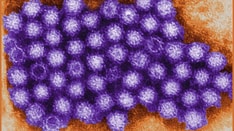Daily high-dose vitamin D during the winter months did not reduce the incidence of viral upper respiratory tract infections (URTIs) among children aged 1 to 5 years, according to results of a study published July 18 in JAMA.
"[S]upplementation with high-dose vitamin D compared with standard dose vitamin D did not reduce all-cause [URTIs] during the winter season despite
a 12.3 ng/mL increase in serum 25-hydroxyvitamin D concentration between groups," the researchers write. "This conclusion remained whether the outcome was defined as number of laboratory-confirmed [URTIs], time to first [URTI] or parent-reported [URTI]."
The fact that vitamin D increases the synthesis of an antimicrobial peptide — cathelicidin — in respiratory epithelium fueled the hypothesis that supplementation might protect against infection. However, clinical and observational studies that have indicated an association between low vitamin D levels and increased risk for viral URTIs in adults and children have had small samples, short duration, and/or no laboratory confirmation of infection.
Mary Aglipay, MSc, from the Department of Pediatrics at St. Michael's Hospital in Toronto, Ontario, Canada, and colleagues conducted a clinical trial to compare infection frequency among 703 children aged 1 to 5 years who received high-dose and standard-dose vitamin D supplementation. The researchers randomly assigned 349 children to receive vitamin D, 2000 IU/day, and 354 children to receive the standard 400 IU/day. The children received care from pediatric or family medicine group practices participating in TARGet Kids!, a primary care research network.
Parents sampled and submitted nasal swabs from their children for every URTI during the winter months from 2012 through 2015. The primary outcome was laboratory-confirmed viral URTI. Secondary outcomes included noninfluenza infections, parent-reported URTIs, time to first URTI, number of influenza infections, and serum vitamin D levels at the study's completion.
The mean number of laboratory-confirmed URTIs was 1.05 (95% confidence interval [CI], 0.91 - 1.19) for the high-dose group and 1.03 (95% CI, 0.90 - 1.16) for the standard-dose group, indicating no statistically significant difference (incidence rate ratio [IRR], 0.97; 95% CI, 0.80 - 1.16). Median time to first laboratory-confirmed URTI did not differ significantly either: 3.95 months (95% CI, 3.02 - 5.95 months) for the high-dose group and 3.29 months (95% CI, 2.66 - 4.14 months) for the standard-dose group. Nor did the number of parent-reported URTIs differ significantly (625 for the high-dose vs 600 for the standard-dose group; IRR, 1.01; 95% CI, 0.88 - 1.16).
At the end of the study period, serum vitamin D levels were 48.7 ng/mL (95% CI, 46.9 - 50.5 ng/mL) in the high-dose group and 36.8 ng/mL (95% CI, 35.4 - 38.2 ng/mL) in the standard-dose group.
Incidence of influenza was 50% lower in the high-dose group (IRR, 0.50; 95% CI, 0.28 - 0.89), but only 16 cases (4.4% of all infections) occurred in that group and only 31 (8.5% of all infections) occurred in the standard-dose group. The groups did not differ for other types of viral infection.
The investigators conclude that high doses of vitamin D do not reduce the number of wintertime viral URTIs among healthy children aged 1 to 5 years and that supplementation is not indicated to prevent such infections. However, they point out that their findings do not rule out a protective effect for the vitamin among subgroups, such as children who have compromised immunity or asthma.
Limitations of the study were gaps in parental submission of swabs and reporting of URTIs (resulting in a possible underestimate of URTI incidence), and lingering effects of sustained sun exposure during the summer months (which would detract from a possible benefit of higher supplementation levels of the vitamin months later).
The researchers have disclosed no relevant financial relationships.
JAMA. 2017;318:245-254. Abstract
Medscape Medical News © 2017
Cite this: High-Dose Vitamin D Does Not Prevent Kids' Colds in Winter - Medscape - Jul 18, 2017.










Comments